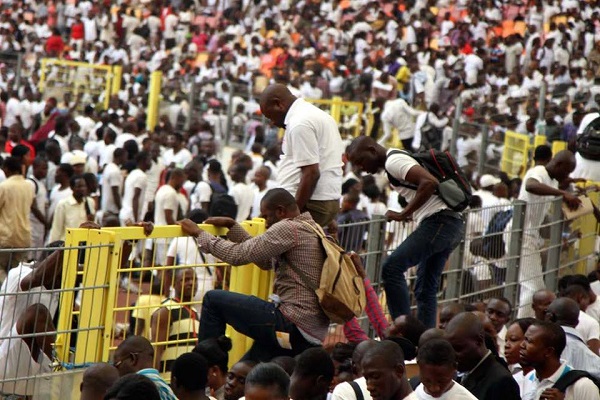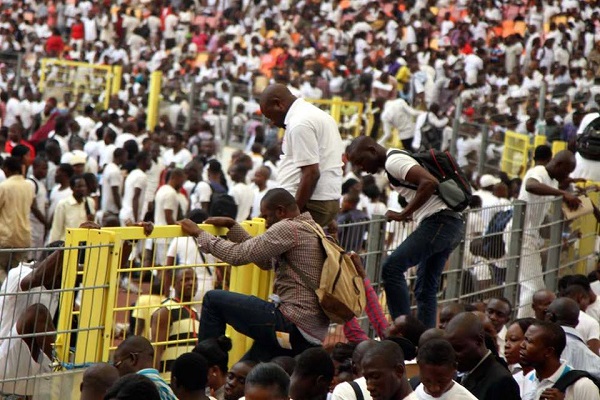
The National Population Commission (NPC) has an enormous task on its hands. It has another chance to produce a comprehensive database to aid national planning and development during the population and housing census scheduled for next year. President Muhammadu Buhari has given his assent for the census to hold in April. To facilitate some of the activities that will lead to the headcount, the Federal Government approved the sum of N177.33 billion for the NPC in this year’s budget.
The commission has already put in motion the process that will culminate in the census. The forthcoming census is going to be the first fully digitalized one in the country. The digital approach will change how the exercise will be conducted. This approach, according to the information posted on the NPC’s website, began with the demarcation of enumeration areas, covering the entire territorial space of the country using mobile handheld devices and geographic information systems (GIS) and satellite imageries to create the digital census map. In other words, it is going to leverage on the advancement in technology by using mobile application (app) devices. This is a major shift in census methodology because it implies a change in how data on population and housing information are to be captured.
Experts say there are three stages of the exercise: pre-census planning, census, and post-enumeration surveys. Before the census, the public is made aware, geographical enumeration areas are demarcated and maps are procured. A journalist and population communication specialist, Isaiah Abraham said preparing for a census is like getting set for war. He said the census is going to be a very highly sophisticated research that will be conducted nationwide to gather data that should provide reliable information on the population size at national, sub-national and lower administrative levels.
How ready is the NPC for the census? Its Director of Public Affairs, Isiaka Yahaya acknowledges that the NPC is facing some challenges ahead of the headcount. But, he said such challenges are not insurmountable and that the commission will tackle them before the census. Yahaya said President Buhari has given his assent for the census to take and it is scheduled to take place after the general elections in April. He said there is no such thing as a low level of awareness. He told The Nation that over 80 per cent of Nigerians are aware that the headcount is coming up next year. He attributes the NPC’s inability to commission jingles on radio and television on the census to financial constraints. He added that since the headcount is still six months away, the commission can still do something to create more awareness about the census among Nigerians.
Nevertheless, there are doubts about whether the census will hold. Indeed, there is also a low level of awareness among the populace nationwide; many Nigerians are not aware that an event of that magnitude is in the offing. The level of preparedness of the commission is also in doubt. The commission’s website has virtually no information on milestones and preparedness. Census, experts say, is a huge scientific responsibility that requires a high level of preparedness, transparency and quality assurance. Ideally, experts say it is better to conduct a census every 10 years to reflect changes in population dynamics. But, given the enormous logistics challenge of conducting a census in Nigeria, the country has not been able to do so at regular intervals. For example, the last one was in 2006. The current census has already been postponed twice in 2016 and 2018 due to several contending factors that have still not abated.
Renowned economist, Dr Ayo Teriba said it is not certain that the headcount will hold, particularly given the Buhari-led administration’s penchant for postponing similar national programmes in recent times. Dr Teriba who spoke to our reporter on the phone said: “Nobody is going to talk about the census until after the general elections. That’s number one. Two, this administration has the tendency of postponing the implementation of some important national programmes. For instance, many postponements have been associated with linking SIM (subscriber identification module) cards with each subscriber’s national identity number (NIN). Voter registrations were also postponed several times. Besides, April 2023 is just one month before the Buhari administration goes; so let’s wait and see.”
But, as Dr Teriba added, lack of awareness may not be the biggest hurdle facing next year’s census. He said: “This low level of awareness may not constitute a problem because the Nigerian government has this habit of declaring a holiday and restricting vehicular movements to conduct such exercises. So, if a holiday is declared and you cannot travel, why won’t you be counted? It’s not an optional thing; it’s mandatory. You don’t go to a census booth; the enumerators come to your house. So, you will be counted whether you are aware or not.”
Like the previous headcounts before it, the biggest challenge facing the current effort remains the fear of politicization of the exercise by the elite. Observers say the 2006 census was marred by political interference and hampered the scientific processes. Some of the most important information, on fertility, mortality, migration and disability, was not collected. Political interest in the exercise affected the composition of the population commission board, of 38 members. Those nominated to superintend over the exercise were not professionals in population or statistics but appointed mostly for political reasons. This put a lot of stress on the census activities. Thus, it could not fulfil one of its critical mandates: providing data below local government levels.
Besides, censuses have always been problematic in Nigeria over the years. The challenges range from staff and logistical shortages to undue political interference and manipulation. The censuses of 1962, 1963 and 1973 were bedevilled with controversies. They were accusations about deliberate manipulation of census figures at sub-national levels. The 1973 census provoked debate along ethnic lines. In 2006, the Lagos State government rejected the figures and ran a parallel census.


















































